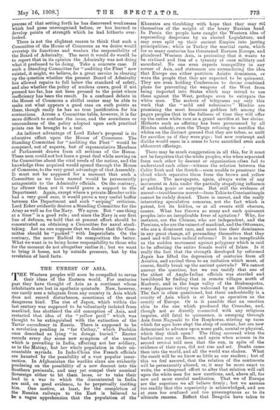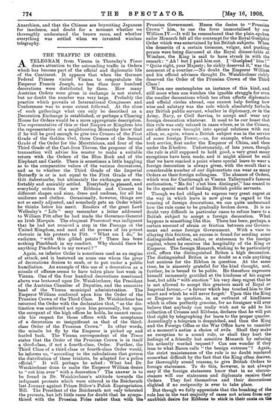THE UNREST OF ASIA.
THE Western peoples will soon be compelled to revise their ideas of the Eastern world. For centuries past they have thought of Asia as a continent whose inhabitants are lost in apathetic quietude. Now, however, one rarely sees a, telegram from any country in Asia which does not record disturbance, sometimes of the most dangerous kind. The rise of Japan, which within the last century was supposed to be voluntarily isolated from mankind, has shattered the old conception of Asia, and restarted that idea of the " yellow peril " which was thought to be extinguished with the extinction of the Tartar ascendency in Russia. There is supposed to be a revolution pending in " far Cathay," which Pushkin once described as lying " in dotage buried." Reuter records every day some new symptom of the unrest which is prevailing in India, affecting not her soldiery, as in the Mutiny, but her whole population in their un- countable myriads. In Indo-China the French officials are haunted by the possibility of a vast popular insur- rection. In Afghanistan the warlike clans are evidently pondering 'on the possibility of a, new descent into the Southern peninsula, and may yet compel their nominal Sovereign either to let them loose, or to take their lead in a war to which the discontented in India are said,' on -good evidence, to be perpetually inciting him. One motive, at least, fnr the completion of the Russian railways to the East is believed to be a vague apprehension that the population of the Khanates are throbbing with hope that they may rid themselves of the weight of the heavy Russian hand. In Persia the people have caught the Western idea of superseding despotism by an elected Legislature, and may even split up their ancient Empire into jarring principalities ; while in Turkey the martial caste, which for so many centuries has threatened Eastern Europe, and plundered Western Asia, is protesting that it wants to be civilised and free of a tyranny at once military and sacerdotal. No one even expects tranquillity in any corner of Asia, and statesmen are surrendering the idea that Europe can either partition Asiatic dominions, or warn the people that they are expected to be quiescent. They are even holding Conferences to devise combined. plans for preventing the weapons of the West from being imported into States which may intend to use them against the West, perhaps even to extirpate the white man. The makers of telegrams say only this week that the " mild and submissive" Hindus are promising the most ferocious goddess left among the pagan peoples that in the fullness of time they will 'offer up the entire white race as a grand sacrifice at her shrine. Hitherto such an offering has been pronounced by all Hindus unholy, even the Thugs refusing to sacrifice the whites on the distinct ground that they are taboo, as unfit for sacrifice as if they were pigs ; but now contempt and dislike would seem in a sense to have sanctified even such abhorrent offerings.
Thera may be much exaggeration in all this, for it must not be forgotten that the white peoples, who when separated from each other by descent or organisation often fail to understand each other—witness the relation between the Celtic Irish and the Scotch—seem unable to penetrate the cloud which separates them from the brown and yellow peoples. The newspapers, again, always write of any movement in Asia under the partially stupefying influence of sudden panic or surprise. But still the evidence of unrest—troublesome unrest—from Tokio to Constantinople cannot be rudely denied. There is unrest, and the really interesting speculation concerns, not the fact which is patent, but its hidden, or at all events still obscure, causes. What has thrown so many and such quiescent peoples into an inexplicable fever of agitation? Why, for instance, are the Chinese, who are independent, and the Persians, who are the vainest of mankind, and the Ottomans, who are a dominant race, and must lose their dominance in any great change, all persuading themselves that they need and will have radical reforms ? It is as inexplicable as the sudden movement against polygamy which is said to be affecting the entire female world of Islam. Is it really the fact that the strength developed by reformed. Japan has lifted the depression of centuries from all Asiatics, and excited them to an imitation which must, of course, finally break up the ancient quietude? We cannot answer the question, but we can testify that one of the ablest of Anglo-Indian officials was startled and bewildered by finding that in remote villages north of Kashmir, and in the huge valley of the Brahmaputra, every Japanese victory was welcomed by an illumination. The fact is often questioned, but there undoubtedly is a, comity of Asia which is at least as operative as the comity of Europe. Or is it possible that an emotion akin to the one which produced the Crusades, and, though not so directly connected with any religious impulse, still fatal to quiescence, is sweeping through Asia from Nagasaki to the Bosphorus, stirring up races which for ages have slept the sleep of content, but are now determined to advance upon some path, mental or physical, which they think open? The thing occurred when the barbarians rose on Rome, and again when science in its second revival told men that the sun, in spite of the evidence of their eyes, did not rise and set. Doubt came then into the world, and all the world was shaken. What the result will be we know as little as our readers ; but of this we feel assured, that the relation of the continents will be permanently altered, or, it may be more exact to write, the widespread effort to alter that relation will call upon the white men for new exertions, and, above all, for new and more careful meditation. That we of Europe are the superiors we all believe firmly ; but we assume too readily that this superiority is acknowledged, and are at once too confused and too presumptuous as to its ultimate reasons. Reflect that Bengalis have taken to Anarchism, and that the Chinese are boycotting Japanese for insolence, and doubt for a moment whether we thoroughly understand the brown races, and whether everything was settled when we invented wireless telegraphy.















































 Previous page
Previous page